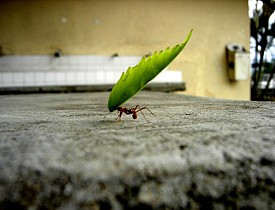Where Ant Colonies Hide in Your House
 Ants usually live in wood or soil outdoors, and only march into your home to gather food, particularly during the spring and summer. On the other hand, ants may live inside the house. It’s important to track down the ant colonies to identify the species and choose the right control. If you can find the ant colony early, you can typically prevent its members from causing serious damage to the home.
Ants usually live in wood or soil outdoors, and only march into your home to gather food, particularly during the spring and summer. On the other hand, ants may live inside the house. It’s important to track down the ant colonies to identify the species and choose the right control. If you can find the ant colony early, you can typically prevent its members from causing serious damage to the home.
Ant Control
To find an ant colony, place food such as jelly, honey, sugar or bacon where you have seen ants in your house, and watch when your "guests" show up for dinner. They will typically create and follow the same route to and from their nest.
University of Kentucky extension entomologist Michael Potter recommends poisoned bait to take of most case of ants in the house. Feeding ants will take the bait back to their nest for the queen and the rest of the colony. Don’t spray ants with insecticides while bait is in use, even if ants appear to increase in number shortly after you set the bait. Spraying kills the ants that are bringing the poisoned bait back to their colony, and therefore defeats the purpose of the bait.
If you choose to use insecticides for ant control instead, focus on cracks, holes and gaps as close to the nest as possible. Here are some of the odd spots where you might find ant nests, and how to identify the ant colonies and control them.
In foundation walls
Several types of ants may build nests in or around foundation walls. The most common, known as larger yellow ants, rarely cause damage or eat human food. Pyrethrins and other spray insecticides are effective for getting rid of most infestations of ants in house foundations.
Under the concrete slab
If small ants are eating your meat, pet food, nuts and dead insects, you may be able to trace them to flooring cracks. If so, they might be living under the concrete slab. University of Minnesota Cooperative Extension experts recommend baiting for ant colonies under concrete slabs.
Inside walls
Various ants live in wall cavities and under floorboards. Many ant colonies can be controlled with syrupy baits.
On insulation
Carpenter ants are among the ants that live in wall cavities, chewing lumber into sawdust and using the sawdust to help build their nests. They are also foam “carpenters,” chewing up and reusing foam insulation. Carpenter ants can degrade both wood and insulation over time, so the University of Minnesota experts recommend finding carpenter ant nests and spraying insecticides directly into the nests.
In rotted window frames
Rotted wood in window frames and similar spots provides an ideal home for acrobat ants and other ant species. If infestations are discovered in wood cavities, inject with powdered insecticides. It’s also important to replace any rotted wood and get rid of the sources of rot and moisture.
Behind kitchen cabinets
Tiny grease ants may seem to appear out of nowhere and sneak into food containers. However, they are actually appearing out of tiny gaps and cavities in the kitchen, including spaces behind kitchen cabinets. Such nests can be difficult to find, but baits may work. Also, wipe up all greasy stains and try to eliminate or seal all attractive food sources, including oils, meats and cheeses.
Keep ants out
Ants find a variety of unusual homes inside your home. Take care to identify the species, find its hiding places, and use the right method to get rid of them. Of course, it’s best to keep ants from getting into the house in the first place. Melanie Barkley of Penn State Cooperative Extension suggests two important prevention measures: 1) Seal all holes and gaps around the house, including the spaces where wires and pipes go in, and 2) repair any leaks to avoid moisture buildup or rotting wood.
Experts at Ohio State University Cooperative Extension also recommend applying an insecticidal spray around the house perimeter, two feet up from the foundation and three feet out into the surrounding soil. Take care when applying insecticides, as they may also attack plants and beneficial insects.
For expert insecticide application, hire a pest control professional.
Related Articles
Looking for a Pro? Call us (866) 441-6648

Pest control Average Costs
Exterminators Experiences

Pest Control Got Rid Of Bedbugs From A "Bargain" Headboard

Mouse Control Got Rid Of A Small But Pesky Problem



